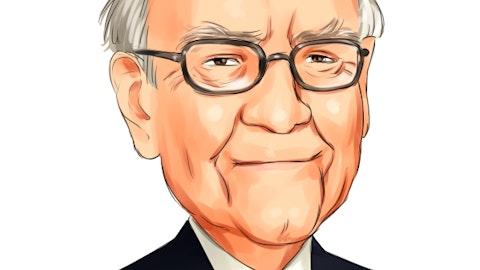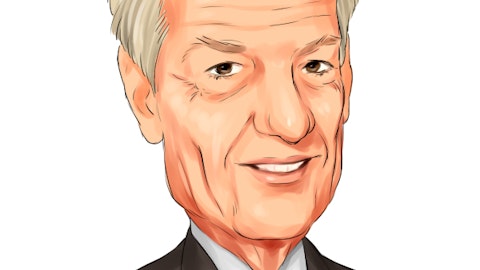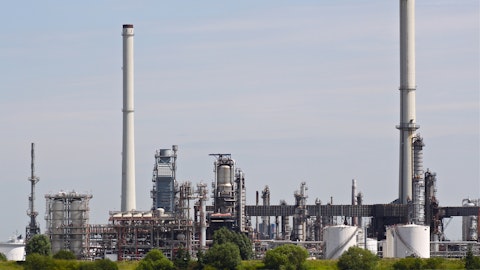Warren Buffett’s Berkshire Hathaway just bought more shares of Phillips 66 (NYSE:PSX). A Form 4 filed with the U.S. Securities and Exchange Commission disclosed Berkshire Hathaway’s acquisition of 3.51 million shares at an average price of $79.37 per share, lifting the holding company’s stake to nearly 61.49 million shares. The stake represents roughly 11.44% of Phillips 66’s outstanding common stock. Buffett’s firm revealed at the end of August that it had amassed a substantial position in the company.

Warren Buffett, known as the “Oracle of Omaha”, needs little to no introduction. He is an investment guru and one of the best and richest businessmen in the world. Buffett’s track record speaks for itself; he has managed to significantly outperform the broader market for a very long time. To be more specific, Buffett’s investment firm delivered an annual compound return of 22.3% between 1957 and 2014. Reportedly, Buffett’s most exceptional investment was buying the book “The Intelligent Investor” written by Benjamin Graham. In the meantime, Berkshire Hathaway oversees a public equity portfolio with a market value of $107.18 billion as of June 30. Buffett recently asserted that the low interest rate environment will likely have unforeseen consequences in the future.
Follow Warren Buffett's Berkshire Hathaway
Hedge funds and other big money managers like Warren Buffett tend to have the largest amounts of their capital invested in large and mega-cap stocks like The Coca-Cola Company (NYSE:KO) because these companies allow for much greater capital allocation. That’s why if we take a look at the most popular stocks among funds, we won’t find any mid- or small-cap stocks there. However, our backtests of hedge funds’ equity portfolios between 1999 and 2012 revealed that the 50 most popular stocks among hedge funds underperformed the market by seven basis points per month, showing that their most popular picks and the ones that received the bulk of their capital were not actually their best picks. On the other hand, their top small-cap picks performed considerably better, outperforming the market by 95 basis points per month. This was confirmed through backtesting and in forward tests of our small-cap strategy since August 2012. The strategy, which involves imitating the 15 most popular small-cap picks among hedge funds has provided gains of 118%, beating the broader market by over 60 percentage points through the end of August (see the details).
Phillips 66 (NYSE:PSX) is a growing energy manufacturing and logistics company with high-performing midstream, chemicals, refining, and marketing and specialties businesses. Nevertheless, Warren Buffett and his team are “not buying it as a refiner” and “certainly not buying it as an integrated oil company”, per their own words; rather, they invest in it because they like the company and its management. The shares of Phillips 66 have gained nearly 13% since the beginning of the year, and have been greatly outperforming other energy companies this year. D.E. Shaw & Co., founded by David E. Shaw, and David Cohen and Harold Levy’s Iridian Asset Management are among the largest equity holders of Phillips 66 within our database, owning stakes of 11.58 million shares and 5.40 million shares, respectively.
Phillips 66 and Spectra Energy Corp. (NYSE:SE) recently announced their agreement to contribute assets to strengthen their 50/50 midstream joint venture, called DCP Midstream LLC. Phillips 66 is set to contribute $1.5 billion in cash, which will be used to pay down a part of the venture’s revolving credit facility. Simultaneously, Spectra Energy will contribute with its ownership interest in both the Sand Hills and Southern Hills NGL pipelines. The following deal is anticipated to strengthen DCP Midstream’s balance sheet and also increase its financial flexibility. Let’s not forget to mention that the joint venture has cut 20% of its corporate staff and consolidated its workforces in Houston and Denver in an attempt to maintain profitability, which in turn had been hurt by the oil slump. DCP Midstream has also been pursing operating cost reduction efforts, including the workforce consolidation mentioned above; attempting to sell certain non-core assets; and converting some of its contracts from commodity price-sensitive to fee-based. All of these measures have assisted the joint venture and Phillips 66 as well in combating the turmoil in the energy sector.
We will now take a quick look at some of the company’s financial figures disclosed in its financial report for the second quarter. Phillips 66 posted earnings of $1.01 billion for the quarter, compared to $987 million reported in the first quarter. At the same time, the company returned $636 million to its shareholders during the quarter: $302 million in dividends and $334 million in repurchases of 4.2 million shares. It’s also worth noting that the company’s cash and cash equivalents added up to $5.1 billion at the end of June, while its debt amounted to $9.0 billion. Therefore, the debt-to-capital ratio is 28% as of June 30, which clearly suggests the company’s financial position is quite healthy.
Disclosure: None





